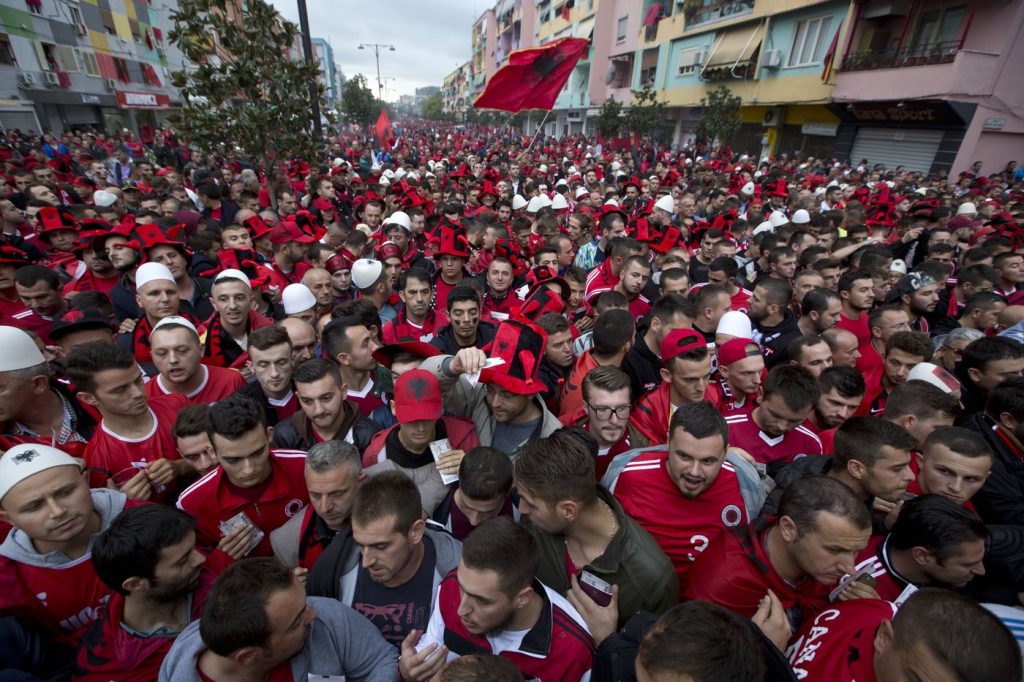TIRANA, Albania (AP) — The anticipation surrounding the upcoming match between Albania and Serbia on Saturday, part of the 2026 World Cup qualifiers, is palpable. This game transcends mere competition for three points; it is steeped in historical and nationalistic tensions that have marked the rivalry between these two nations.
This clash is not just another soccer match; it ignites deep-rooted emotions tied to the complex history of the Balkan region, particularly relating to the Kosovo conflict. Serbia and Albania are both in the same European qualifying group for the World Cup, alongside England, Latvia, and Andorra. The last encounter on Albanian soil dates back to 2015, when Serbia claimed victory with a score of 2-0, despite the absence of Serbian fans from the stands due to safety concerns.
The repercussions of past confrontations loom large, especially memories of a brawl that erupted during a 2014 match in Belgrade. This incident was triggered by a drone flying an Albanian flag, which led to chaos on the field and resulted in the game being abandoned. Albania was awarded a 3-0 victory, sealing their historic qualification for the 2016 European Championship — their first appearance in such a prestigious tournament. This backdrop of historical animosities is compounded by the fact that Kosovo, which has a majority Albanian population, declared independence from Serbia in 2008, a move that Serbia staunchly does not recognize.
As Tirana readies itself for this latest showdown, the heightened tensions and nationalistic fervor persist, particularly among fans. Approximately half of the Albanian national team consists of players with Albanian heritage from Kosovo, North Macedonia, or southern Serbia, further intertwining the identities of the teams and their supporters.
Defender Elseid Hysaj, who participated in the tumultuous 2014 match, emphasized the need for calm, stating that the players should focus on their roles and provide the best performance possible for their fans. The president of the Albanian Football Federation, Armand Duka, echoed this sentiment, urging fans to view the match as a sporting event that deserves positive energy and support.
To ensure safety and an atmosphere conducive to a sporting event, there will be significant police presence, road closures, and searches for fans entering the stadium. Serbian fans are notably barred from attending, a decision Duka believes will help create a quieter environment. In a bid to advance relations, Albania and Serbia are scheduled to co-host the Under-21 European Championship in 2027, reinforcing attempts to ease political tensions.
Despite some progress, the rivalry remains fraught with underlying tensions. Nationalist sentiments and fan behavior continue to complicate relations on both sides, leading to sanctions from UEFA due to politically charged incidents. Serbian President Aleksandar Vucic did not help calm these tensions and recently urged the national team towards victory, stating, “Go there and beat them,” during a rally of his supporters, adding pressure to the match.
Nevertheless, coach Dragan Stojkovic and his players are striving to shift focus back to the game itself, labeling it as just another match. Stojkovic acknowledged the importance of starting the qualifiers on the right foot while also showing respect for Albania.
As the match approaches, the stakes are high, both on the field and off, reflecting how, in the realm of international soccer, games can be far more than mere competitions; they are often a reflection of complex histories and national identities.










